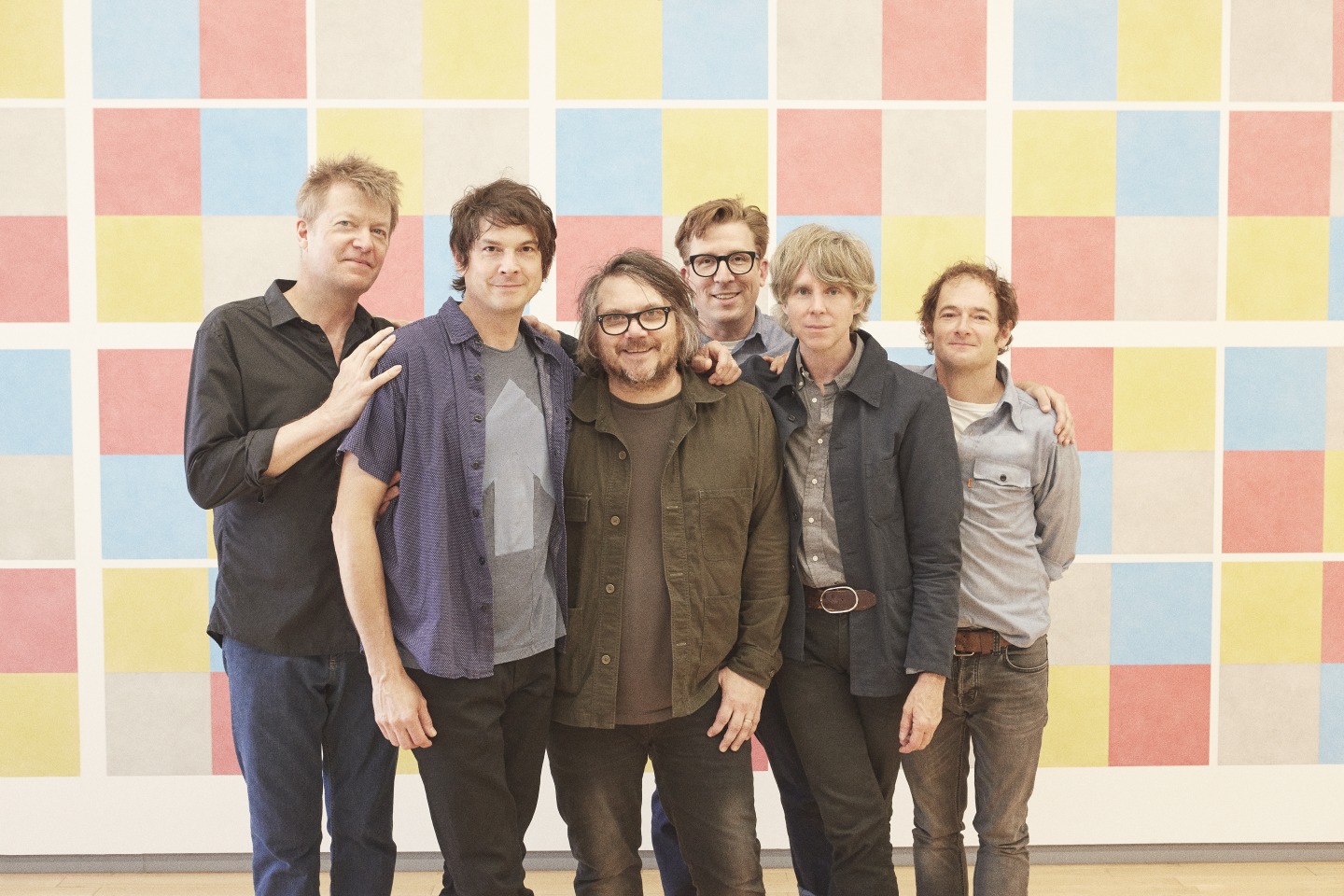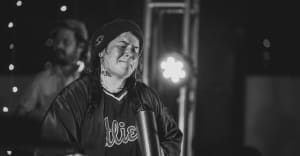 Annabel Mehran
Annabel Mehran
Jeff Tweedy and Wilco have been on an absolute tear lately. After sitting out most of the first half of the 2010s following the lush, lovely The Whole Love in 2011, the back half of this decade have seen them in nearly constant activity: the left-of-center Star Wars in 2015, 2016’s more straightforward (but no less enjoyable) Schmilco, two solo albums from Tweedy, and a much-ballyhooed memoir from the man himself. This fall saw the release of Wilco’s eleventh studio album, Ode to Joy, a quietly loud and loudly quiet release that finds the band essentially reinventing themselves in the midst of a career loaded with reinventions. Where’s this current spate of productivity coming from?
“There’s a lot less energy being spent parenting now,” Tweedy tells me over the phone in a break from studio time, where he’s hard at work on more projects — maybe Wilco-related, maybe not — that he claims is “not at liberty to divulge,” with a good-natured chuckle punctuating the reticence. “I feel like I’ve always been pretty prolific — it’s just been harder to translate everything into something worth sharing.”
But what he and Wilco have found worth sharing has also been worth checking out, and that goes double for Ode to Joy. Wilco have always been restlessly experimental even when they haven’t gotten credit for it, and the shuffling unease that lies under Ode to Joy is another fascinating left turn from one of North America’s most intriguing rock bands of the last several decades. Read on for our conversation about creativity, rock music, family, and the last dream Tweedy had (it will surprise you!).
What does family mean to you?
Your main focus in life should be to make the people closest to you feel supported and encouraged — that's where community and your interactions with the world start. The idea of a “family man” or “family values” ran roughshod over everybody's feelings about that word during the punk rock era, but as I got older, I realized that punk rock was a family. There's nothing embarrassing or humiliating about that — it's kind of the whole fucking point. If you're not working to promote a lifestyle that you feel is beneficial to another human, then I don't really know what you're fighting for or against.
After the 2016 election, a lot of people who’d never been to a protest were trying to make their voices heard. Have you attended any in the past year?
Yeah, they weren't my first though. My family have attended different protests and marches in Chicago, including going to the airport when the Muslim ban was announced. I think that the protests at the airport did a lot in the short-term to help out, but it's important for lots of reasons to be part of something like that — to see it for yourself that you're not alone, to feel you're not crazy and you're seeing what you're seeing, hearing what you're hearing.
People telling you that you're not hearing and seeing what you are seeing is maddening — especially if you start to believe that you're just searching for your own version of reality in the media that you consume. The downside is that something like the Women's March is, at times, a little too comforting, I think. There was a lot of anger there, but it was consumed by a lot of love and maybe a little bit of mollifying the experience for a lot of people.
What’s your perception about darkness and light in your own work?
Pretty ambiguous. A lot of the things that I've done tend to have a Rorschach effect. People come at me with, "Wow, the record is really hopeful," but Sammy asked me, "Does this record mean you don't have any hope for the future?" I aspire to be accurate in the things that I make, and in that regard, I guess that that gives me some satisfaction, because I do feel hopeless and I feel like we're in a pretty dark moment.
I gather it from all of the people around me that there’s a pervasive weight on everyone that wasn't there three or four years ago — it's undeniable and it's real. But I'm an optimist, believe it or not. My darkest moments have come and gone, and they may come again, but the next time I feel as bad as I've ever felt, I have more evidence that I probably will feel better again at some point. Whereas, when I was younger, there was no convincing me that it was ever going to get better. Luckily, I’m still here.
Tell me about the making of Ode to Joy.
Star Wars and Schmilco were pieced together more from previous recordings I'd done by myself. Those records are very different from each other, but they had a similar process. This record, there was an excitement about the idea of being in the same room together and building something from the ground up. We set aside six weeks at the beginning of the year to make the record, and because of everybody else's outside projects and complex schedules, it just ended up being whittled down to a shorter period than we had initially planned. Glenn and I are the only ones left living in Chicago, so we started on the record in December and basically built the scaffolding, and everybody else came in and played as an ensemble on top of what Glenn and I had made.
Glenn has that kind of training where he can write everything out, and it's a really interesting way to record because you get so much more out of each individual element. We wanted to make a rock record that sounds like a band that's never heard rock music and is reimagining it from reading about it in books 100 years in the future. "What was this rock music you speak of?"
How do you feel the band’s ability to collaborate has changed over time?
The best thing about a band like Wilco being together for so long is that music really relies on trust — it's a really intimate activity. For people to be intimate with each other, it depends upon a level of trust that's really hard to manufacture without time. So there's a deep sense of trust in each others’ abilities and less concern within a group of musicians like Wilco to assert themselves in a way that shows off their virtuosity. There's plenty of ego in the band, and that's good — I want people to have their egos invested in what they're doing. It requires believing in yourself, but insecurity is the part where people start acting weird and nit-picky and arguing about things that don't affect the beauty.
When’s the last time you felt creatively insecure?
This morning? My whole life has been vacillating between overconfidence and an almost deluded belief in my abilities.They're like poles of a magnet that propel me forward somehow, and I'm used to it now, but it was much more disorienting as a younger person. I don't trust anybody who's confident all the time — that's fucked up.
You talked a little bit about rock music earlier. What’s some current rock music you listen to?
In general, I don't know if I listen to very much at all that's new that I would classify as straight-up rock anymore. Things that are explicitly called rock music, like Greta Van Fleet, just sound purified and complicit to me. On one hand, they're doing something they fucking love and I don't have any problem with that — that's great, I don't care. But on the other hand, it runs in the face of what I felt was the whole point of freeing and liberating yourself.
A lot of rock sounds scared to me — scared of losing their audience and cultural importance. That seems to be rooted in the same type of fear that's causing our political scene to be so easily manipulated. The music that I like that doesn't have that is Cate Le Bon and hip-hop — artists that have this forward momentum and are plowing into the future. There's a lack of caution about it that I find more artistically invigorating.
There’s a quote in the press materials about how no one needs any more Wilco music right now. What do you think people need?
I think they need to take a walk without listening to any music. They need a hug. I can think of a million things they need before anyone's record. A lot of times, records are filling the void of real human connection that a lot of people are missing — that's been that way for a long time. Records fill a void for me that would've been more healthfully replaced with some real understanding and companionship.
There probably isn't a single piece of art in the world that's worth as much as the idea of making art. Think of all the art that’s disappeared from our consciousness over a long period of time. We've still found masterpieces and inspiration because each piece of art has the potential of something you can do. You can create, and that seems more valuable than any one person's artistic statement.
What was the last dream you had?
I don't really remember my dreams very often, but the last one I can remember is Bon Iver getting a bunch of really bad reviews. It was this schadenfreude, where I woke up and I was really happy. And I like Justin! But there's a competitive part of me that I'm probably suppressing, where it just had to come out in a dream. But it was blissful.
